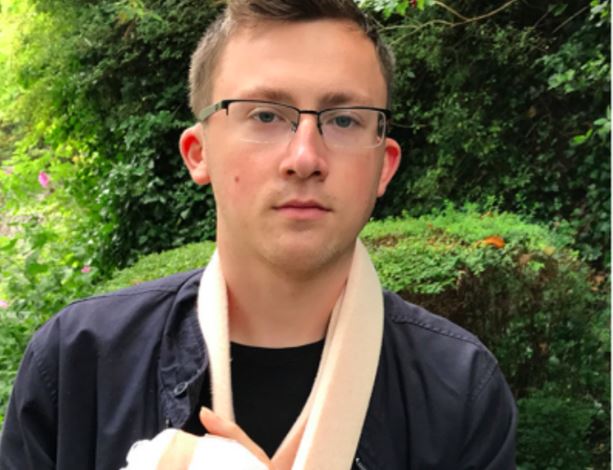Anthony Seward, 21, a worker’s hand has been sewn into his stomach after it was crushed in a factory machine accident.
He feared he would lose his left hand for good after it was crushed in the unprotected machine at the Heathcoat Fabrics of Tiverton, Devon, in August last year.
But surgeons saved it by creating a ‘pocket’ inside his stomach which kept it alive for three weeks.
The tips of some of his fingers were amputated in the horror accident but they may eventually be replaced by his toes.
And thanks to the quick-thinking medics, Anthony has regained partial use of his hand and hopes eventually to have it fully back.
Details of the extraordinary operation to save his hand emerged during a court case at Exeter on Tuesday.
Anthony’s former employers were fined £300,000 after admitting health and safety offences when they failed to replace a broken safety barrier on the mangle.
Magistrates heard how the hand operation was an old fashioned procedure commonly used on soldiers in World War Two.
The unusual op at Southmead NHS Hospital in Bristol, called a Pedicled Abdominal Flap, involved creating a ‘pocket’ inside Anthony’s stomach.
It was separated from his abdomen and the skin was folded over to cover his entire hand which was put inside it.
The op was carried out by surgeon James Henderson who said: “Normally there are more sophisticated ways of transplanting tissue but Anthony’s injury was so severe it was decided to do it this way.
“It’s now quite rare as we don’t see that many injuries that require this treatment.”
The “very old-fashioned procedure” was first described by surgeons in 1900 and used a lot during World War Two to treat injured servicemen.
It has also been used on soldiers coming back from Afghanistan.
Anthony, from Tiverton, Devon, has now had two further operations to separate his fingers and is able to move them independently.
His fingers could eventually be improved with transplants from his toes “to give him a good fingertip for gripping fine objects”.
The textiles company admitted contravening health and safety regulations by failing to prevent access to the dangerous parts of the L-Stenter mangle at their plant.
The court heard a light curtain, which automatically stops the rollers on the machine when the beam of light is broken, had been installed in 2009 but broke down in 2014.
Replacement parts had been ordered, but rather than being installed, a risk assessment had been undertaken that decided that the use of an emergency stop-cord would be sufficient as a safety measure.
Mitigating for Heathcoat Fabrics, Christopher Ducann said: “This was a complete tragedy as to what had happened and it is truly regrettable.
Anthony Seward, 21, a worker’s hand has been sewn into his stomach after it was crushed in a factory machine accident.
He feared he would lose his left hand for good after it was crushed in the unprotected machine at the Heathcoat Fabrics of Tiverton, Devon, in August last year.
But surgeons saved it by creating a ‘pocket’ inside his stomach which kept it alive for three weeks.
The tips of some of his fingers were amputated in the horror accident but they may eventually be replaced by his toes.
And thanks to the quick-thinking medics, Anthony has regained partial use of his hand and hopes eventually to have it fully back.
Details of the extraordinary operation to save his hand emerged during a court case at Exeter on Tuesday.
Anthony’s former employers were fined £300,000 after admitting health and safety offences when they failed to replace a broken safety barrier on the mangle.
Magistrates heard how the hand operation was an old fashioned procedure commonly used on soldiers in World War Two.
The unusual op at Southmead NHS Hospital in Bristol, called a Pedicled Abdominal Flap, involved creating a ‘pocket’ inside Anthony’s stomach.
It was separated from his abdomen and the skin was folded over to cover his entire hand which was put inside it.
The op was carried out by surgeon James Henderson who said: “Normally there are more sophisticated ways of transplanting tissue but Anthony’s injury was so severe it was decided to do it this way.
“It’s now quite rare as we don’t see that many injuries that require this treatment.”
The “very old-fashioned procedure” was first described by surgeons in 1900 and used a lot during World War Two to treat injured servicemen.
It has also been used on soldiers coming back from Afghanistan.
Anthony, from Tiverton, Devon, has now had two further operations to separate his fingers and is able to move them independently.
His fingers could eventually be improved with transplants from his toes “to give him a good fingertip for gripping fine objects”.
The textiles company admitted contravening health and safety regulations by failing to prevent access to the dangerous parts of the L-Stenter mangle at their plant.
The court heard a light curtain, which automatically stops the rollers on the machine when the beam of light is broken, had been installed in 2009 but broke down in 2014.
Replacement parts had been ordered, but rather than being installed, a risk assessment had been undertaken that decided that the use of an emergency stop-cord would be sufficient as a safety measure.
Mitigating for Heathcoat Fabrics, Christopher Ducann said: “This was a complete tragedy as to what had happened and it is truly regrettable.
Anthony Seward, 21, a worker’s hand has been sewn into his stomach after it was crushed in a factory machine accident.
He feared he would lose his left hand for good after it was crushed in the unprotected machine at the Heathcoat Fabrics of Tiverton, Devon, in August last year.
But surgeons saved it by creating a ‘pocket’ inside his stomach which kept it alive for three weeks.
The tips of some of his fingers were amputated in the horror accident but they may eventually be replaced by his toes.
And thanks to the quick-thinking medics, Anthony has regained partial use of his hand and hopes eventually to have it fully back.
Details of the extraordinary operation to save his hand emerged during a court case at Exeter on Tuesday.
Anthony’s former employers were fined £300,000 after admitting health and safety offences when they failed to replace a broken safety barrier on the mangle.
Magistrates heard how the hand operation was an old fashioned procedure commonly used on soldiers in World War Two.
The unusual op at Southmead NHS Hospital in Bristol, called a Pedicled Abdominal Flap, involved creating a ‘pocket’ inside Anthony’s stomach.
It was separated from his abdomen and the skin was folded over to cover his entire hand which was put inside it.
The op was carried out by surgeon James Henderson who said: “Normally there are more sophisticated ways of transplanting tissue but Anthony’s injury was so severe it was decided to do it this way.
“It’s now quite rare as we don’t see that many injuries that require this treatment.”
The “very old-fashioned procedure” was first described by surgeons in 1900 and used a lot during World War Two to treat injured servicemen.
It has also been used on soldiers coming back from Afghanistan.
Anthony, from Tiverton, Devon, has now had two further operations to separate his fingers and is able to move them independently.
His fingers could eventually be improved with transplants from his toes “to give him a good fingertip for gripping fine objects”.
The textiles company admitted contravening health and safety regulations by failing to prevent access to the dangerous parts of the L-Stenter mangle at their plant.
The court heard a light curtain, which automatically stops the rollers on the machine when the beam of light is broken, had been installed in 2009 but broke down in 2014.
Replacement parts had been ordered, but rather than being installed, a risk assessment had been undertaken that decided that the use of an emergency stop-cord would be sufficient as a safety measure.
Mitigating for Heathcoat Fabrics, Christopher Ducann said: “This was a complete tragedy as to what had happened and it is truly regrettable.
Anthony Seward, 21, a worker’s hand has been sewn into his stomach after it was crushed in a factory machine accident.
He feared he would lose his left hand for good after it was crushed in the unprotected machine at the Heathcoat Fabrics of Tiverton, Devon, in August last year.
But surgeons saved it by creating a ‘pocket’ inside his stomach which kept it alive for three weeks.
The tips of some of his fingers were amputated in the horror accident but they may eventually be replaced by his toes.
And thanks to the quick-thinking medics, Anthony has regained partial use of his hand and hopes eventually to have it fully back.
Details of the extraordinary operation to save his hand emerged during a court case at Exeter on Tuesday.
Anthony’s former employers were fined £300,000 after admitting health and safety offences when they failed to replace a broken safety barrier on the mangle.
Magistrates heard how the hand operation was an old fashioned procedure commonly used on soldiers in World War Two.
The unusual op at Southmead NHS Hospital in Bristol, called a Pedicled Abdominal Flap, involved creating a ‘pocket’ inside Anthony’s stomach.
It was separated from his abdomen and the skin was folded over to cover his entire hand which was put inside it.
The op was carried out by surgeon James Henderson who said: “Normally there are more sophisticated ways of transplanting tissue but Anthony’s injury was so severe it was decided to do it this way.
“It’s now quite rare as we don’t see that many injuries that require this treatment.”
The “very old-fashioned procedure” was first described by surgeons in 1900 and used a lot during World War Two to treat injured servicemen.
It has also been used on soldiers coming back from Afghanistan.
Anthony, from Tiverton, Devon, has now had two further operations to separate his fingers and is able to move them independently.
His fingers could eventually be improved with transplants from his toes “to give him a good fingertip for gripping fine objects”.
The textiles company admitted contravening health and safety regulations by failing to prevent access to the dangerous parts of the L-Stenter mangle at their plant.
The court heard a light curtain, which automatically stops the rollers on the machine when the beam of light is broken, had been installed in 2009 but broke down in 2014.
Replacement parts had been ordered, but rather than being installed, a risk assessment had been undertaken that decided that the use of an emergency stop-cord would be sufficient as a safety measure.
Mitigating for Heathcoat Fabrics, Christopher Ducann said: “This was a complete tragedy as to what had happened and it is truly regrettable.
Anthony Seward, 21, a worker’s hand has been sewn into his stomach after it was crushed in a factory machine accident.
He feared he would lose his left hand for good after it was crushed in the unprotected machine at the Heathcoat Fabrics of Tiverton, Devon, in August last year.
But surgeons saved it by creating a ‘pocket’ inside his stomach which kept it alive for three weeks.
The tips of some of his fingers were amputated in the horror accident but they may eventually be replaced by his toes.
And thanks to the quick-thinking medics, Anthony has regained partial use of his hand and hopes eventually to have it fully back.
Details of the extraordinary operation to save his hand emerged during a court case at Exeter on Tuesday.
Anthony’s former employers were fined £300,000 after admitting health and safety offences when they failed to replace a broken safety barrier on the mangle.
Magistrates heard how the hand operation was an old fashioned procedure commonly used on soldiers in World War Two.
The unusual op at Southmead NHS Hospital in Bristol, called a Pedicled Abdominal Flap, involved creating a ‘pocket’ inside Anthony’s stomach.
It was separated from his abdomen and the skin was folded over to cover his entire hand which was put inside it.
The op was carried out by surgeon James Henderson who said: “Normally there are more sophisticated ways of transplanting tissue but Anthony’s injury was so severe it was decided to do it this way.
“It’s now quite rare as we don’t see that many injuries that require this treatment.”
The “very old-fashioned procedure” was first described by surgeons in 1900 and used a lot during World War Two to treat injured servicemen.
It has also been used on soldiers coming back from Afghanistan.
Anthony, from Tiverton, Devon, has now had two further operations to separate his fingers and is able to move them independently.
His fingers could eventually be improved with transplants from his toes “to give him a good fingertip for gripping fine objects”.
The textiles company admitted contravening health and safety regulations by failing to prevent access to the dangerous parts of the L-Stenter mangle at their plant.
The court heard a light curtain, which automatically stops the rollers on the machine when the beam of light is broken, had been installed in 2009 but broke down in 2014.
Replacement parts had been ordered, but rather than being installed, a risk assessment had been undertaken that decided that the use of an emergency stop-cord would be sufficient as a safety measure.
Mitigating for Heathcoat Fabrics, Christopher Ducann said: “This was a complete tragedy as to what had happened and it is truly regrettable.
Anthony Seward, 21, a worker’s hand has been sewn into his stomach after it was crushed in a factory machine accident.
He feared he would lose his left hand for good after it was crushed in the unprotected machine at the Heathcoat Fabrics of Tiverton, Devon, in August last year.
But surgeons saved it by creating a ‘pocket’ inside his stomach which kept it alive for three weeks.
The tips of some of his fingers were amputated in the horror accident but they may eventually be replaced by his toes.
And thanks to the quick-thinking medics, Anthony has regained partial use of his hand and hopes eventually to have it fully back.
Details of the extraordinary operation to save his hand emerged during a court case at Exeter on Tuesday.
Anthony’s former employers were fined £300,000 after admitting health and safety offences when they failed to replace a broken safety barrier on the mangle.
Magistrates heard how the hand operation was an old fashioned procedure commonly used on soldiers in World War Two.
The unusual op at Southmead NHS Hospital in Bristol, called a Pedicled Abdominal Flap, involved creating a ‘pocket’ inside Anthony’s stomach.
It was separated from his abdomen and the skin was folded over to cover his entire hand which was put inside it.
The op was carried out by surgeon James Henderson who said: “Normally there are more sophisticated ways of transplanting tissue but Anthony’s injury was so severe it was decided to do it this way.
“It’s now quite rare as we don’t see that many injuries that require this treatment.”
The “very old-fashioned procedure” was first described by surgeons in 1900 and used a lot during World War Two to treat injured servicemen.
It has also been used on soldiers coming back from Afghanistan.
Anthony, from Tiverton, Devon, has now had two further operations to separate his fingers and is able to move them independently.
His fingers could eventually be improved with transplants from his toes “to give him a good fingertip for gripping fine objects”.
The textiles company admitted contravening health and safety regulations by failing to prevent access to the dangerous parts of the L-Stenter mangle at their plant.
The court heard a light curtain, which automatically stops the rollers on the machine when the beam of light is broken, had been installed in 2009 but broke down in 2014.
Replacement parts had been ordered, but rather than being installed, a risk assessment had been undertaken that decided that the use of an emergency stop-cord would be sufficient as a safety measure.
Mitigating for Heathcoat Fabrics, Christopher Ducann said: “This was a complete tragedy as to what had happened and it is truly regrettable.
Anthony Seward, 21, a worker’s hand has been sewn into his stomach after it was crushed in a factory machine accident.
He feared he would lose his left hand for good after it was crushed in the unprotected machine at the Heathcoat Fabrics of Tiverton, Devon, in August last year.
But surgeons saved it by creating a ‘pocket’ inside his stomach which kept it alive for three weeks.
The tips of some of his fingers were amputated in the horror accident but they may eventually be replaced by his toes.
And thanks to the quick-thinking medics, Anthony has regained partial use of his hand and hopes eventually to have it fully back.
Details of the extraordinary operation to save his hand emerged during a court case at Exeter on Tuesday.
Anthony’s former employers were fined £300,000 after admitting health and safety offences when they failed to replace a broken safety barrier on the mangle.
Magistrates heard how the hand operation was an old fashioned procedure commonly used on soldiers in World War Two.
The unusual op at Southmead NHS Hospital in Bristol, called a Pedicled Abdominal Flap, involved creating a ‘pocket’ inside Anthony’s stomach.
It was separated from his abdomen and the skin was folded over to cover his entire hand which was put inside it.
The op was carried out by surgeon James Henderson who said: “Normally there are more sophisticated ways of transplanting tissue but Anthony’s injury was so severe it was decided to do it this way.
“It’s now quite rare as we don’t see that many injuries that require this treatment.”
The “very old-fashioned procedure” was first described by surgeons in 1900 and used a lot during World War Two to treat injured servicemen.
It has also been used on soldiers coming back from Afghanistan.
Anthony, from Tiverton, Devon, has now had two further operations to separate his fingers and is able to move them independently.
His fingers could eventually be improved with transplants from his toes “to give him a good fingertip for gripping fine objects”.
The textiles company admitted contravening health and safety regulations by failing to prevent access to the dangerous parts of the L-Stenter mangle at their plant.
The court heard a light curtain, which automatically stops the rollers on the machine when the beam of light is broken, had been installed in 2009 but broke down in 2014.
Replacement parts had been ordered, but rather than being installed, a risk assessment had been undertaken that decided that the use of an emergency stop-cord would be sufficient as a safety measure.
Mitigating for Heathcoat Fabrics, Christopher Ducann said: “This was a complete tragedy as to what had happened and it is truly regrettable.
Anthony Seward, 21, a worker’s hand has been sewn into his stomach after it was crushed in a factory machine accident.
He feared he would lose his left hand for good after it was crushed in the unprotected machine at the Heathcoat Fabrics of Tiverton, Devon, in August last year.
But surgeons saved it by creating a ‘pocket’ inside his stomach which kept it alive for three weeks.
The tips of some of his fingers were amputated in the horror accident but they may eventually be replaced by his toes.
And thanks to the quick-thinking medics, Anthony has regained partial use of his hand and hopes eventually to have it fully back.
Details of the extraordinary operation to save his hand emerged during a court case at Exeter on Tuesday.
Anthony’s former employers were fined £300,000 after admitting health and safety offences when they failed to replace a broken safety barrier on the mangle.
Magistrates heard how the hand operation was an old fashioned procedure commonly used on soldiers in World War Two.
The unusual op at Southmead NHS Hospital in Bristol, called a Pedicled Abdominal Flap, involved creating a ‘pocket’ inside Anthony’s stomach.
It was separated from his abdomen and the skin was folded over to cover his entire hand which was put inside it.
The op was carried out by surgeon James Henderson who said: “Normally there are more sophisticated ways of transplanting tissue but Anthony’s injury was so severe it was decided to do it this way.
“It’s now quite rare as we don’t see that many injuries that require this treatment.”
The “very old-fashioned procedure” was first described by surgeons in 1900 and used a lot during World War Two to treat injured servicemen.
It has also been used on soldiers coming back from Afghanistan.
Anthony, from Tiverton, Devon, has now had two further operations to separate his fingers and is able to move them independently.
His fingers could eventually be improved with transplants from his toes “to give him a good fingertip for gripping fine objects”.
The textiles company admitted contravening health and safety regulations by failing to prevent access to the dangerous parts of the L-Stenter mangle at their plant.
The court heard a light curtain, which automatically stops the rollers on the machine when the beam of light is broken, had been installed in 2009 but broke down in 2014.
Replacement parts had been ordered, but rather than being installed, a risk assessment had been undertaken that decided that the use of an emergency stop-cord would be sufficient as a safety measure.
Mitigating for Heathcoat Fabrics, Christopher Ducann said: “This was a complete tragedy as to what had happened and it is truly regrettable.





















